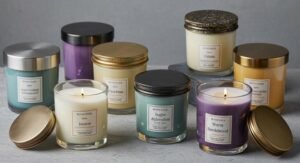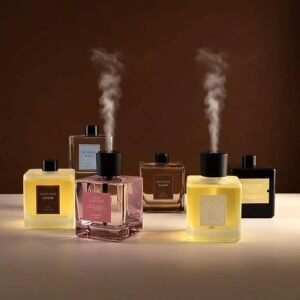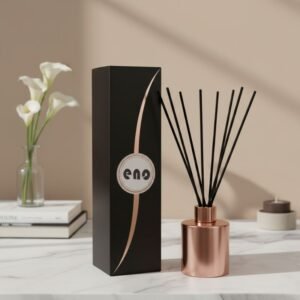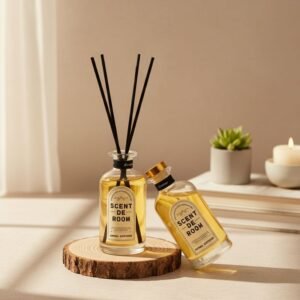As marcas de perfumes de marca própria lutam para encontrar fornecedores fiáveis de fragrâncias à base de óleo que ofereçam uma qualidade consistente e satisfaçam a crescente procura dos consumidores.
Para selecionar os fabricantes de óleos de perfumaria certos, é necessário avaliar as capacidades de produção, as práticas de sustentabilidade, as estruturas de custos e as certificações de qualidade, para garantir que as suas fragrâncias à base de óleo atingem uma longevidade de aroma e uma satisfação do cliente superiores às alternativas tradicionais à base de álcool.
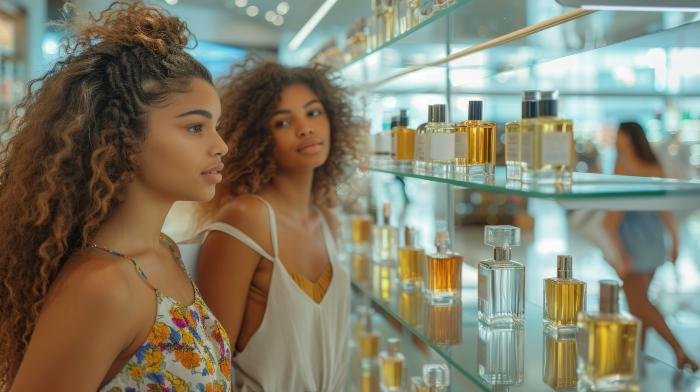
O mercado das fragrâncias à base de óleo continua a expandir-se à medida que os consumidores procuram alternativas mais duradouras e amigas da pele aos perfumes convencionais.
O que torna os perfumes à base de óleo diferentes das fragrâncias tradicionais?
As marcas de distribuidor enfrentam uma pressão crescente por parte dos clientes que procuram alternativas mais duradouras e amigas da pele aos perfumes tradicionais à base de álcool.
Os perfumes à base de óleo diferem fundamentalmente através do seu meio de transporte, oferecendo uma longevidade do aroma 2-3 vezes mais longa e uma compatibilidade superior com a pele em comparação com as alternativas à base de álcool, ao mesmo tempo que requerem uma embalagem especializada e conhecimentos de formulação.
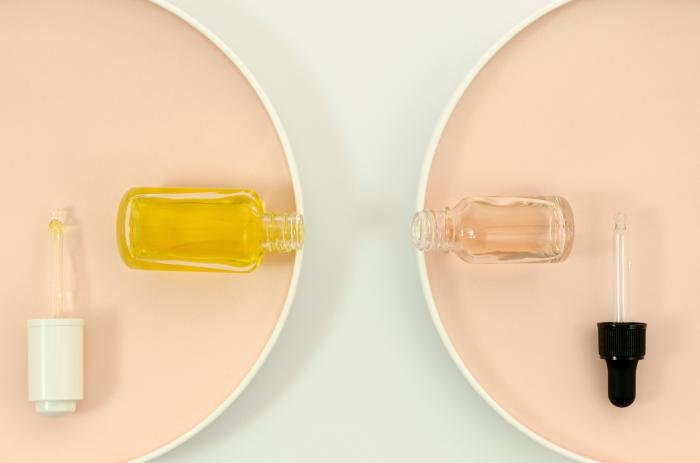
A ciência por detrás dos sistemas de base de óleo vs. álcool
A distinção fundamental reside no comportamento molecular. As fragrâncias à base de álcool utilizam o etanol como um transportador volátil que se evapora rapidamente, dispersando as moléculas de aroma de forma rápida mas breve. As formulações à base de óleo utilizam óleos transportadores não voláteis, como o óleo de jojoba ou o óleo de coco fraccionado, que criam ligações moleculares com os lípidos da pele. Esta abordagem de mistura de óleos essenciais assegura uma libertação gradual do aroma ao longo de 8-12 horas, em comparação com a janela de 2-4 horas do álcool.
Para as marcas de marca própria, isto traduz-se na retenção de clientes através da superioridade do desempenho. As formulações à base de óleo requerem diferentes estratégias de seleção de bases de fragrâncias, utilizando frequentemente concentrações mais elevadas de compostos aromáticos (15-30%) em comparação com os perfumes tradicionais (5-15%).
Considerações sobre o fabrico e a embalagem
Os perfumes à base de óleo apresentam desafios únicos na cadeia de abastecimento que as marcas inteligentes devem enfrentar. A viscosidade mais elevada exige técnicas especializadas de selagem de frascos a granel para evitar fugas durante o transporte. Os mecanismos tradicionais de pulverização falham frequentemente com as formulações à base de óleo, necessitando de aplicações roll-on ou conta-gotas.
| Aspeto | À base de óleo | À base de álcool |
|---|---|---|
| Longevidade do aroma | 8-12 horas | 2-4 horas |
| Compatibilidade com a pele | Hidratante, suave | Pode secar |
| Complexidade da embalagem | Elevado (problemas de viscosidade) | Padrão |
| Custo de produção | 15-20% superior | Linha de base |
| Flexibilidade de formulação personalizada | Excelente | Bom |
A experiência da Loveeno em embalagens sensíveis à viscosidade garante que os seus produtos à base de óleo chegam intactos aos clientes, enquanto os nossos sistemas de controlo de fugas minimizam as dispendiosas perdas de produto durante a distribuição.
Como é que se pode avaliar a qualidade dos fabricantes de óleo de perfume de designer?
A seleção de um parceiro de fragrâncias à base de óleo incorreto ameaça a reputação da sua marca com produtos de qualidade inferior e entregas pouco fiáveis, podendo prejudicar a confiança dos clientes para sempre.
A avaliação da qualidade requer a avaliação da conformidade com a IFRA, das capacidades de fabrico, da experiência em formulações personalizadas e da fiabilidade da cadeia de fornecimento para garantir que os seus produtos de fragrâncias à base de óleo cumprem as normas do mercado de luxo.
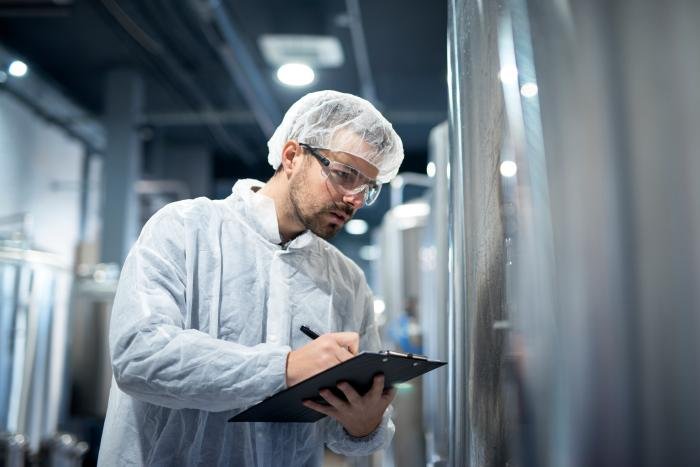
Normas de certificação e conformidade
O melhor fabricante de fragrâncias à base de óleo deve demonstrar Conformidade com a IFRA e abrangente certificação de fragrâncias para garantir a segurança do produto e a aceitação do mercado. As normas da IFRA (Associação Internacional de Fragrâncias) fornecem diretrizes globalmente reconhecidas para a utilização segura de ingredientes de fragrâncias através de avaliação científica. Os fabricantes que aderem a estas normas garantem transparência e segurança nas suas formulações.
Para além da conformidade com a IFRA, avalie as certificações ISO para os processos de fabrico, as BPF (Boas Práticas de Fabrico) para as instalações de produção e os protocolos de teste de alergénios. Estas certificações indicam que os controlo de qualidade medidas que protegem a sua marca de questões regulamentares e preocupações com a segurança do cliente.
Avaliação das capacidades de fabrico
Avaliar a capacidade de produção, óleos de perfume personalizados experiência em formulação e capacidades técnicas. Solicite visitas às instalações ou documentação detalhada dos processos de fabrico, especificações do equipamento e procedimentos de teste de qualidade. O fabricante deve demonstrar experiência em formulações à base de óleo, compreender os requisitos de viscosidade e as necessidades de embalagem especializadas.
| Critérios de avaliação | Método de avaliação | Indicadores de qualidade |
|---|---|---|
| Capacidade de produção | Revisão das capacidades de volume | Mínimo de 10.000 unidades mensais |
| Formulação personalizada | Revisão da carteira | Mais de 50 fórmulas únicas |
| Testes de qualidade | Certificações laboratoriais | Protocolos de ensaio de terceiros |
| Cadeia de fornecimento | Dados sobre o desempenho da entrega | 98%+ taxa de entrega atempada |
| Especialização em embalagens | Amostras de vedação de garrafas a granel | Sistemas de embalagem sem fugas |
Considere as capacidades de embalagem sensíveis à viscosidade e a experiência em selagem de garrafas a granel para evitar fugas durante o transporte. As soluções especializadas de embalagem à base de óleo da Loveeno asseguram a integridade do produto desde o fabrico até à entrega ao consumidor final, abordando os desafios críticos da cadeia de fornecimento no mercado das fragrâncias à base de óleo.
Que capacidades de produção deve procurar nos parceiros de óleo de perfume?
Encontrar parceiros fiáveis de óleos de perfume parece simples até que os problemas de produção destruam toda a sua linha de produtos. Uma capacidade de fabrico deficiente pode levar a formulações inconsistentes, lotes contaminados e à destruição da reputação da marca.
As capacidades de produção essenciais incluem sistemas de destilação avançados, laboratórios de controlo de qualidade, conhecimentos de formulação personalizados e equipamento de embalagem especializado concebido para fragrâncias à base de óleo com um manuseamento adequado da viscosidade.
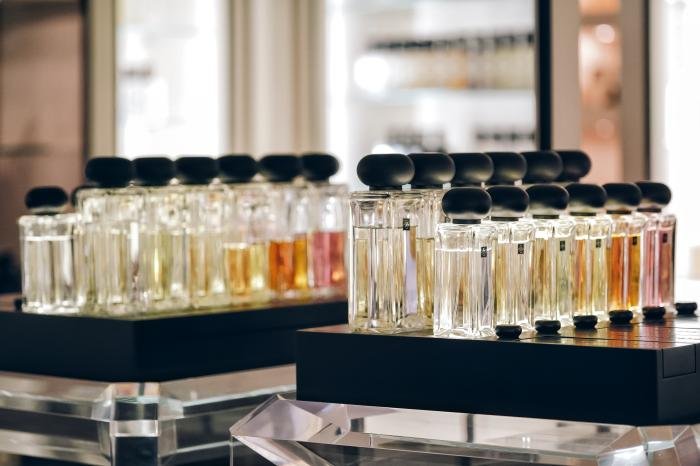
Tecnologias avançadas de destilação e extração
A produção moderna de attar requer equipamento sofisticado para além dos métodos tradicionais de Deg e Bhapka. Procure parceiros com sistemas de destilação controlados por computador que garantam uma gestão consistente da temperatura e da pressão. Estes sistemas permitem uma extração precisa dos óleos essenciais, mantendo a integridade da fragrância. Os parceiros de qualidade investem em equipamento de análise espectrofotométrica para verificar a pureza do óleo e a consistência da cor ao longo do processo de desenvolvimento da fragmentação.
O parceiro escolhido deve demonstrar experiência em vários métodos de extração, incluindo destilação a vapor, extração de CO2 e técnicas sem solventes. Esta versatilidade permite a criação de aromas personalizados que satisfazem requisitos de formulação específicos, mantendo a perceção de luxo que a sua marca exige.
Infraestrutura de controlo de qualidade e de testes
As capacidades de produção devem incluir laboratórios de testes abrangentes com equipamento de cromatografia gasosa e espetrometria de massa (GC-MS) para análise molecular. Esta tecnologia garante que cada lote cumpre as normas de segurança e mantém perfis de aroma consistentes. Os parceiros de fabrico de marcas privadas devem fornecer certificados de análise detalhados para cada remessa.
| Capacidade de produção | Equipamento de série | Benefício de qualidade |
|---|---|---|
| Teste de pureza | Espectrofotómetro | Cor/clareza consistente |
| Análise molecular | Sistema GC-MS | Formulação exacta |
| Controlo de Viscosidade | Reómetro | Fluxo correto do perfume roll-on |
| Deteção de contaminação | Laboratório de microbiologia | Prazo de validade alargado |
Os parceiros eficazes implementam vários pontos de controlo de qualidade ao longo da produção, desde a inspeção da matéria-prima até à embalagem final. Esta abordagem sistemática evita recolhas dispendiosas e mantém as vantagens de longevidade que distinguem as fragrâncias à base de óleo das alternativas à base de álcool.
Porque é que as práticas de sustentabilidade são importantes na seleção dos fornecedores de óleos para perfumaria?
As marcas de distribuidor enfrentam uma pressão crescente por parte dos consumidores conscientes. A sustentabilidade não é uma tendência - está a tornar-se um requisito comercial que tem um impacto direto na reputação da marca e no posicionamento no mercado.
O fabrico sustentável de fragrâncias assegura o abastecimento ético, reduz o impacto ambiental e satisfaz as crescentes exigências dos consumidores de fragrâncias sem crueldade, mantendo simultaneamente os padrões de qualidade dos perfumes à base de óleo.
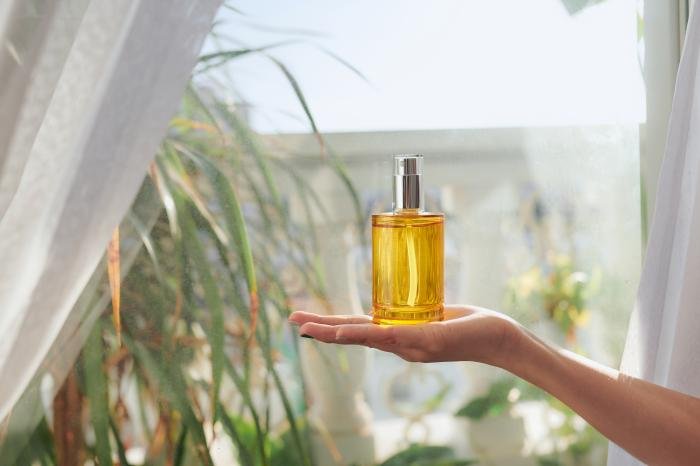
Impacto ambiental e reputação da marca
Os fornecedores de perfumes de óleo que implementam o fabrico sustentável de fragrâncias demonstram um compromisso com a gestão ambiental. Estas práticas incluem a utilização de fontes de energia renováveis, a minimização do desperdício de água e a implementação de princípios de economia circular nos ciclos de produção. As marcas que se associam a fornecedores com consciência ecológica protegem-se de futuras alterações regulamentares e apelam aos consumidores com consciência ambiental que, cada vez mais, pesquisam os valores da empresa antes de comprar.
A pegada de carbono da produção de perfumes à base de óleo é significativamente diferente das alternativas à base de álcool. O fornecimento responsável de ingredientes botânicos, combinado com métodos de extração eficientes, cria uma vantagem competitiva para as marcas que dão ênfase ao luxo natural. Empresas como a Loveeno dão prioridade a práticas sustentáveis na sua cadeia de fornecimento, assegurando que os processos de selagem de frascos a granel minimizam o desperdício e mantêm a integridade do produto.
Normas Cruelty-Free e acesso ao mercado
As fragrâncias sem crueldade tornaram-se uma necessidade do mercado e não uma opção. Os fornecedores de perfumes de óleo que aderem às normas éticas de produção de perfumes eliminam os testes em animais dos seus processos de desenvolvimento, obtendo frequentemente certificações de organizações como a Leaping Bunny ou a aprovação da PETA.
| Prática de sustentabilidade | Impacto nas empresas | Benefício para o consumidor |
|---|---|---|
| Testes sem crueldade | Alarga o acesso ao mercado da UE/Reino Unido | Paz de espírito ética |
| Embalagem ecológica | Redução dos custos de transporte | Responsabilidade ambiental |
| Aprovisionamento responsável | Coerência da qualidade | Perceção de ingredientes de primeira qualidade |
| Produção neutra em termos de carbono | Vantagens do seguro | Alinhamento com a consciência climática |
Este processo de certificação tem um impacto direto no acesso ao mercado, particularmente em regiões com regulamentos rigorosos em matéria de testes em animais. As marcas de marca própria que selecionam fornecedores com credenciais comprovadas de ausência de crueldade evitam atrasos dispendiosos na certificação e melhoram o posicionamento da sua marca em segmentos de mercado de elevada qualidade.
Como é que as estruturas de custos e as condições de encomenda se comparam entre os fabricantes de perfumes de óleo?
As marcas privadas enfrentam decisões complexas em matéria de preços quando avaliam os fabricantes de perfumes de óleo. As múltiplas variáveis de custo e os requisitos de encomenda complicam as decisões de seleção de fornecedores.
Os fabricantes de óleo de perfume normalmente exigem quantidades mínimas de encomenda de 1.000-5.000 unidades, com encomendas de fragrâncias a granel a partir de $10.000-$50.000. As condições de pagamento do fabricante variam de 30 a 60 dias líquidos, enquanto o preço do óleo de perfume diminui significativamente com compromissos de volume superiores a 10.000 unidades.
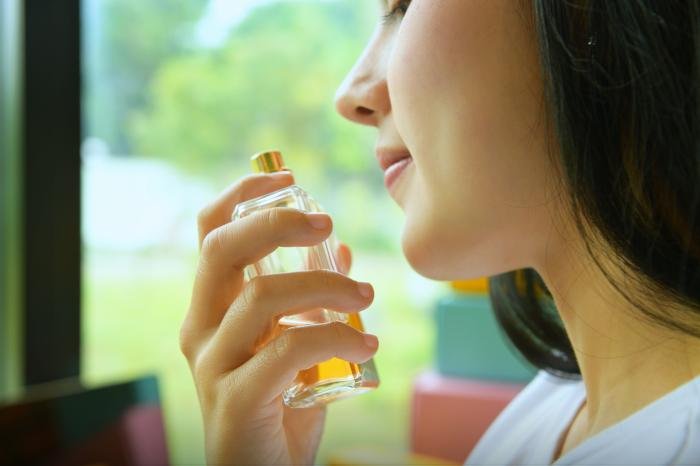
Estruturas de preços baseadas no volume
Os custos de produção de fragrâncias variam drasticamente com base no volume de encomendas e nos requisitos de personalização. A maioria dos fabricantes de produtos à base de óleo opera em modelos de preços escalonados em que os custos unitários diminuem à medida que as quantidades aumentam. As encomendas iniciais inferiores a 1.000 unidades podem custar $15-25 por unidade, enquanto os volumes superiores a 10.000 unidades podem reduzir os custos para $8-12 por unidade. A formulação personalizada acrescenta 20-40% ao preço base, mas fornece perfis de aroma exclusivos que diferenciam as marcas privadas.
Os custos das matérias-primas representam 40-60% das despesas totais de produção, sendo que os óleos essenciais têm um preço mais elevado do que as alternativas sintéticas. A mão de obra e as despesas gerais representam mais 25-35%, enquanto a embalagem contribui com 15-20% para os custos finais.
Condições de pagamento e requisitos financeiros
A maioria dos fabricantes estabelecidos exige depósitos de 30-50% aquando da confirmação da encomenda, devendo o pagamento do saldo ser efectuado no prazo de 30-60 dias após a expedição. Alguns fornecedores oferecem condições de pagamento alargadas para clientes estabelecidos ou encomendas maiores, mas estes acordos exigem normalmente verificações de crédito e garantias financeiras.
| Volume de encomendas | MOQ típico | Faixa de custo unitário | Condições de pagamento | Prazo de execução |
|---|---|---|---|---|
| Pequeno (1K-5K) | 1.000 unidades | $15-25 | Depósito 50%, líquido 30 | 4-6 semanas |
| Médio (5K-15K) | 2.500 unidades | $12-18 | Depósito 30%, líquido 45 | 6-8 semanas |
| Grande (15K+) | 5.000 unidades | $8-15 | Depósito 25%, Net 60 | 8-12 semanas |
A vantagem competitiva da Loveeno reside nos requisitos flexíveis de quantidade mínima de encomenda e nas estruturas de preços transparentes, permitindo que as marcas privadas de menor dimensão tenham acesso a fragrâncias premium à base de óleo sem investimentos iniciais proibitivos.
Conclusão
Selecionar os fabricantes de óleo de perfume de autor certos requer uma avaliação cuidadosa das capacidades de produção, certificações de qualidade, práticas de sustentabilidade e estruturas de custos para garantir que as suas fragrâncias à base de óleo proporcionam uma longevidade superior e a satisfação do cliente. Parcerias inteligentes de marca própria com fornecedores em conformidade com a IFRA que demonstrem experiência em formulação personalizada, normas sem crueldade e termos de encomenda flexíveis irão diferenciar a sua marca no competitivo mercado de fragrâncias, ao mesmo tempo que satisfazem a crescente procura dos consumidores por alternativas duradouras e amigas da pele aos perfumes tradicionais à base de álcool.
FAQ
Q1: Quais são as principais diferenças entre os perfumes à base de óleo e os perfumes à base de álcool?
Os perfumes à base de óleo utilizam óleos transportadores como o óleo de jojoba ou o óleo de coco fraccionado como base, oferecendo uma maior longevidade do aroma e uma silagem mais íntima. Os perfumes à base de álcool evaporam-se mais rapidamente, proporcionando uma explosão inicial mais forte, mas um tempo de utilização mais curto. As fragrâncias à base de óleo são também menos secantes para a pele e ideais para tipos de pele sensíveis.
P2: Como se compara a longevidade do aroma entre os perfumes à base de óleo e os perfumes à base de álcool?
Os perfumes à base de óleo duram normalmente mais tempo na pele devido à sua taxa de evaporação mais lenta, proporcionando frequentemente 6-12 horas de utilização. Os perfumes à base de álcool, apesar de serem mais intensos inicialmente, normalmente desvanecem-se em 4-6 horas. A escolha depende do equilíbrio desejado entre projeção e longevidade.
Q3: O que devo procurar ao escolher um fabricante de óleo de perfume de marca?
Ao selecionar um fabricante, dê prioridade a fornecedores com conformidade com a IFRA, fornecimento transparente e experiência em embalagens sensíveis à viscosidade. Procure aqueles que oferecem soluções de selagem de frascos a granel para evitar fugas e garantir a consistência da qualidade da fragrância. Além disso, considere a sua capacidade de personalizar aromas para marcas privadas.
Q4: Os perfumes à base de óleo são adequados para todos os tipos de pele?
Sim, os perfumes à base de óleo são geralmente mais suaves e adequados para todos os tipos de pele, incluindo a pele sensível. No entanto, é aconselhável verificar a lista de ingredientes para detetar potenciais alergénios ou irritantes, especialmente se a fragrância contiver óleos essenciais ou compostos sintéticos.
Q5: Como posso garantir a qualidade dos perfumes à base de óleo durante a entrega a granel?
Para manter a qualidade, trabalhe com fabricantes que utilizam embalagens à prova de fugas e engarrafamento adequado à viscosidade. Certifique-se de que cumprem as normas da indústria, como as diretrizes da IFRA, e que fornecem relatórios de testes de lotes. A selagem adequada e as condições de armazenamento durante o transporte também são fundamentais para evitar a degradação.

